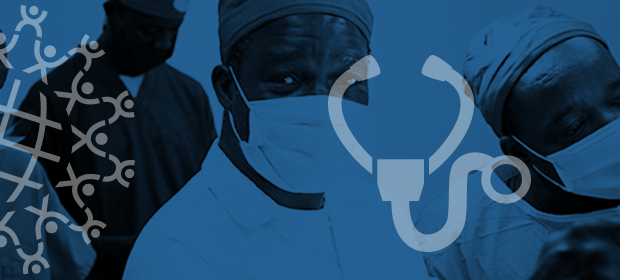Where We Work
See our interactive map


History now records 1996 as one of West Africa’s worst meningitis outbreaks. Dr. Babacar Gueye remembers it well.
Meet Dr. El hadji Babacar Gueye, IntraHealth International’s country director in Senegal. Gueye is a military-trained physician who has worked in public health in West Africa for more than 20 years. The story of what motivates Gueye is a glimpse into the reality of working in an underresourced health care system.
Early in his career, Gueye was the medical director of the Velingara District of Senegal, a rural province in the southwestern portion of the country. The year was 1996. One Sunday, some men from a local village came to his home unannounced, pleading for his assistance. All the children in their village were dying, they said.
At the village entrance were 21 small wooden boxes, which Gueye later learned were coffins.
Gueye got in his vehicle and drove the 22 kilometers on rough roads to the village. At the village entrance were 21 small wooden boxes, which Gueye later learned were coffins. Upon examining one child who was on his deathbed, Gueye realized what was happening in the village: a meningitis outbreak.
History now records 1996 as one of West Africa’s worst outbreaks of the infectious disease. By the end of its cycle, meningitis had infected more than 100,000 people in the African Meningitis Belt in under 3 months, killing more than 20,000.
Meningococcal meningitis is an airborne bacterium. If caught early, it can be treated with antibiotics. Meningitis is also preventable via vaccination. Yet when access to health services and vaccinations are not easily available to Senegalese villagers like in Velingara District in 1996, people—especially children—are vulnerable.
That experience is one that has forged Gueye’s passion and commitment to working in public health.
“There is a lot of meaningful and important work that needs to be done outside the hospital or clinic setting,” he says, “especially in the rural areas.”
It has been rewarding to see the impact firsthand.
More recently, Gueye was one of the visionaries behind IntraHealth’s largest project in Senegal, called the Health Services Improvement Project. The five-year project’s goal: to focus on local health providers’ clinical, leadership, and management skills, thereby improving the overall quality of health services. It secured $32 million in funding from the US Agency for International Development and the endorsement of the Senegalese government.
“From pre- and postnatal consultations and maternity services to family planning and vaccinations, we are working to improve access to these basic services across the country, no matter where someone lives,” Gueye says.
As my three-month Pfizer Global Health Fellow assignment with IntraHealth came to a close I thought of all my IntraHealth colleagues—many of them health workers like Gueye—who’ve inspired me. It has been rewarding to see firsthand the impact of their efforts and to support them through my fellowship assignment by documenting their successes in photos, videos, and stories.Learn more about the Pfizer Global Health Fellows program here.
Senegal was a warm and welcome jolt to my system and I will forever be appreciative for the opportunity to go there. This toubab (Wolof term to describe foreigners) returned to Canada culturally richer, emotionally refreshed, and very grateful for all the conveniences available in North America—most especially, access to high-quality health care services.
Thank you IntraHealth, and thank you Pfizer for this professional experience of a lifetime. And special thanks to my husband and son for my “mommy leave of absence.”
Get the latest updates from the blog and eNews




